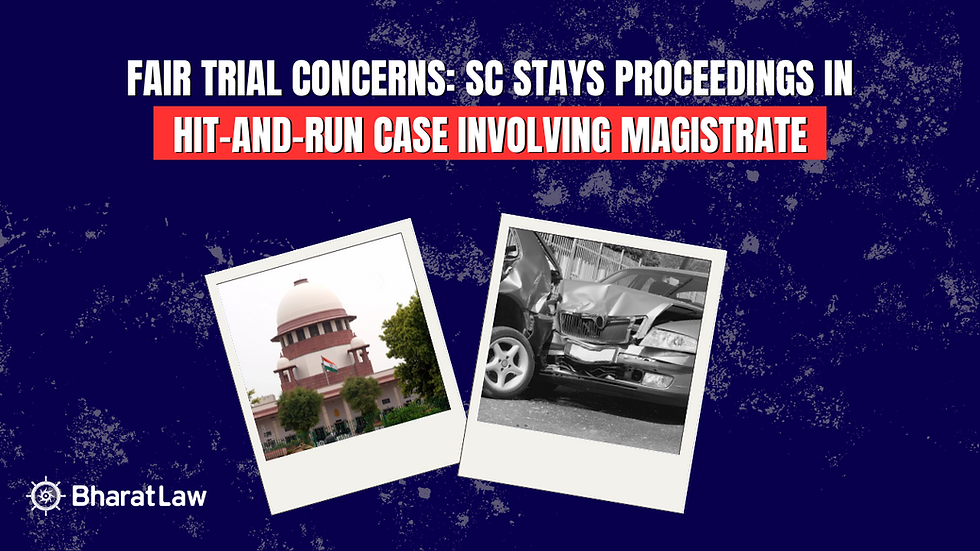Termination Must Not Be Selective or Arbitrary – Supreme Court’s Landmark Ruling on Judicial Probation Dismissals
- Chintan Shah

- Mar 3, 2025
- 4 min read
Summary of the Judgment
Case Name: Sarita Choudhary v. High Court of Madhya Pradesh & Another
Date of Judgment: 28th February 2025
Court: Supreme Court of India
Judges: Hon'ble Justice Nagarathna
Advocates:
Petitioner: Sri Basant, Senior Advocate (for Sarita Choudhary); Ms. Indira Jaising, Senior Advocate (for Aditi Kumar Sharma)
Respondent (High Court of Madhya Pradesh): Shri Arjun Garg
Amicus Curiae: Sri Gaurav Aggarwal, Senior Advocate
Acts & Sections Involved:
Constitution of India: Article 311(2)
Madhya Pradesh Judicial Service (Recruitment and Conditions of Service) Rules, 1994
Cited Judgments:
Anoop Jaiswal v. Government of India, (1984) 2 SCC 369
Dipti Prakash Banerjee v. Satyendra Nath Bose National Centre for Basic Sciences, (1999) 3 SCC 60
Swati Priyadarshini v. State of Madhya Pradesh, 2024 SCC OnLine SC 2139
Registrar General, High Court of Gujarat v. Jayshree Chamanlal Buddhbhatti, (2013) 16 SCC 59
Background of the Case
This case concerns the termination of two judicial officers, Ms. Sarita Choudhary and Ms. Aditi Kumar Sharma, during their probation period in the Madhya Pradesh Judicial Service. Their dismissal was challenged before the Supreme Court through writ petitions and a suo motu case initiated by the Chief Justice of India after receiving complaints from affected officers. While four other terminated judicial officers were reinstated, the High Court of Madhya Pradesh refused to reconsider the cases of these two petitioners, leading to the present adjudication.
Key Issues Before the Supreme Court
Was the termination of the judicial officers justified, or was it arbitrary and discriminatory?
Did the High Court of Madhya Pradesh violate principles of natural justice by failing to communicate adverse remarks in the ACRs before termination?
Should warnings and advisories given to the petitioners be considered punitive, requiring a full inquiry under Article 311(2) of the Constitution?
Revisional Jurisdiction and Probationary Termination
The Supreme Court examined whether the termination orders were legally sound or disguised as punitive dismissals. The Court reiterated that:
“If termination is based on misconduct, it ceases to be a simple termination and must comply with Article 311(2) of the Constitution.”
The Court referred to Anoop Jaiswal and Dipti Prakash Banerjee to emphasise that courts can lift the veil to determine if a dismissal is a form of punishment in disguise.
Performance and Adverse Remarks in ACRs
The Court scrutinised the Annual Confidential Reports (ACRs) of both officers:
Sarita Choudhary: Her ACR for 2022 improved to “C-Good,” but her termination was based on earlier warnings and low unit value in previous years.
Aditi Kumar Sharma: Her 2022 ACR was “D-Average,” but her termination was based on complaints and declining unit disposal rates.
Significantly, the Court found that some adverse remarks were communicated after their termination, violating natural justice.
“Non-communication of adverse remarks before termination deprives the officer of an opportunity to improve and violates Article 14 of the Constitution.”
Lack of a Formal Inquiry and the Impact of Warnings
The Court found that the High Court of Madhya Pradesh had issued multiple warnings to the petitioners but did not conduct a formal inquiry before terminating them.
For Sarita Choudhary, complaints about procedural lapses were closed with warnings, and the Full Court considered these warnings in its decision to terminate her.
For Aditi Kumar Sharma, complaints regarding conduct in the courtroom and her behaviour were highlighted, but they were not formally investigated.
The Supreme Court held that warnings and advisories cannot be used as a substitute for a proper inquiry under Article 311(2) of the Constitution. It cited Swati Priyadarshini v. State of Madhya Pradesh to reaffirm that if disciplinary actions are factored into termination, due process must be followed.
Consideration of Complaints Against Petitioners
The Court found that:
Most complaints against Sarita Choudhary had been disposed of with warnings or advisories.
Aditi Kumar Sharma was implicated in minor complaints, including one regarding a social media post, but no inquiry was conducted.
Relying on Registrar General, High Court of Gujarat v. Jayshree Chamanlal Buddhbhatti, the Court held:
“If allegations of misconduct are considered in termination, a formal inquiry is required under Article 311(2).”
Since no inquiry was conducted, the Supreme Court deemed their dismissal arbitrary.
Precedents on Natural Justice and Termination
The Supreme Court relied on key precedents to reinforce the importance of natural justice and due process in termination cases.
In Anoop Jaiswal v. Government of India, the Court ruled that termination orders can be scrutinised to determine whether they are punitive in nature.
In Dipti Prakash Banerjee v. Satyendra Nath Bose National Centre, it was held that non-communication of adverse remarks before termination violates natural justice.
In Registrar General, High Court of Gujarat v. Jayshree Chamanlal Buddhbhatti, it was established that dismissal due to alleged misconduct requires a formal inquiry.
The Supreme Court applied these principles and ruled that both petitioners were denied a fair opportunity to contest the grounds of their termination.
Supreme Court’s Decision
The Supreme Court ruled in favour of the petitioners and passed the following directions:
The termination orders were quashed.
The petitioners were reinstated on probation for one year.
They would be placed at the bottom of their batch without back wages.
The High Court of Madhya Pradesh was directed to ensure fair evaluation during their probation.
Conclusion
This judgment reinforces judicial scrutiny over terminations disguised as probationary discharges. By upholding principles of natural justice, it ensures that judicial officers are not arbitrarily dismissed without due process. The ruling sets a crucial precedent for protecting judicial independence and procedural fairness in the Indian judiciary.



Comments